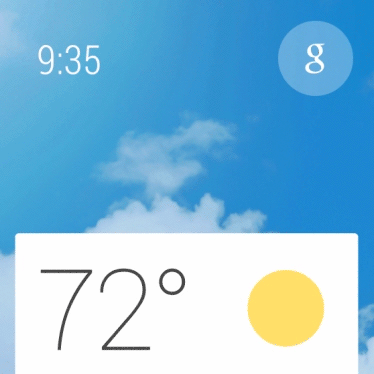App makers already have so many wearable platforms to choose from. There’s the bble SDK, which drives the crowd-funded bble’s e-ink screen; Samsung’s Tizen, which powers its second-generation Galaxy Gear smartwatches, Sony’s own Smarttch developer platform, just to name a few.
And now there’s ’s Android ar, which brings the Android codebase developer tools to those looking to exp beyond phones tablets. The last two days have evoked a flurry of reactions from around the web about what’s in store for Android’s future, now that has officially blessed the smartwatch trend. But it’s the developers who seem to be the most excited about showing users what their apps are capable of on your wrist.
talked to a few app makers with popular titles in the ay store the message is clear: they’re running—not walking—to develop for ’s newly released Android-based wearables platform.
A natural evolution for Android
“Right away we looked through the [documents], signed up for the developer preview, are anxiously awaiting more information,” said e Bondi, Technology Officer at RunKeeper, an app that helps you keep track of your fitness activities. “ all have powerful connected smartphones in our pockets, but wearables will exp compliment the accessibility, computing capabilities of mobile apps how we interact with them.”

Now that ’s Android ar has officially entered the ring, developers can choose to stick with an SDK that’s directly connected to the Android codebase services they already use to write mobile apps.
That’s why indie developer Oldenburg, the brains behind the app shBullet, which pushes Android notifications directly to your desktop, is betting on ’s wearables SDK. “Android ar provides a solid foundation based on Android… it already has a huge number of partners,” he said. “This means the audience for ar-optimized apps is going to be huge,” he added.
There is a slight caveat to all this, however. The Android ar SDK only works with Android 4.3 higher, which means that developers will be limited to a fraction of the total Android market (currently at about 9 percent of Android users globally, according to the Android Developer dashboard).
More possibilities with ar
You may have heard of Evernote, the company that has managed to make its feature-filled note taking app popular on almost every single platform imaginable. The introduction of the Android ar SDK is just another method of distribution for Evernote so that it can convince more users to stick to its products for their archival needs, possibly try out some new features, too.

“[Android ar] seems very much focused on notifications voice control, which I think will make it extremely accessible to a mainstream audience,” said Damian Mehers, senior software developer at Evernote. “There is a natural match with Evernote’s existing notification capabilities whereby you can tell Evernote to remind you about a specific note at a specific time.” Mehers added that a future iteration of the app could integrate some kind of functionality that would allow users to create a note while busy (say, when driving a car) simply by saying “OK , Take a Note,” or to quickly search through notes via voice.
Challenges ahead
Android ar also introduces a peculiar new concept derived from traditional watches: a round screen. You may wonder how developers will get around that new type of display, but Bondi just sees it as something that “will force app developers designers to ensure that only essential information is being displayed.” That should help keep those notification popups short sweet.
Despite all the unforeseeable possibilities, developers don’t believe that smartwatches will completely overthrow smartphones. “The wearables will operate untethered from the phone, but they will still require a base mobile app for their full range of capabilities,” said Bondi. “The smartphone will still be your central device with computing power Internet connectivity.”
en asked what lies ahead for the competition, Oldenburg was honest with his answer. “I think bble is in a really tough spot now,” he said, matter-of-factly. “As far as the Samsung Galaxy Gear, Qualcomm Toq…those are all forgettable first-generation products. I don’t see a future in them unless they can integrate with Android better than ar can, which is the epitome of unlikely.”
















